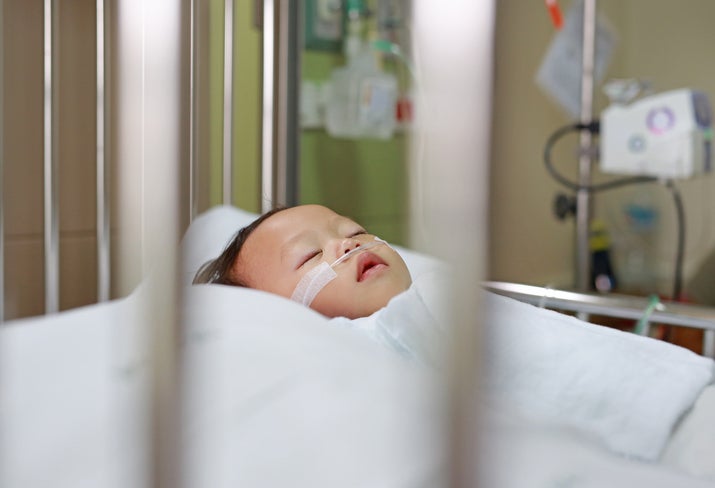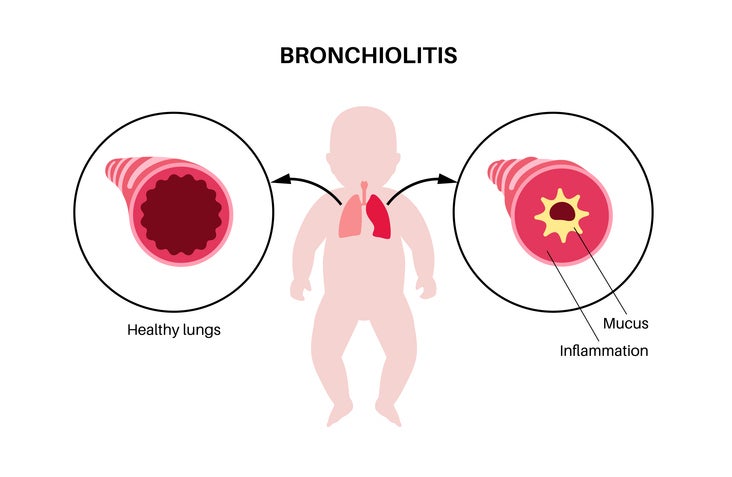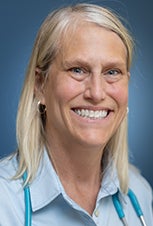RSV Safety for Babies, Pregnant Women and Older Adults
November 12, 2024
Respiratory Syncytial Virus, knowns as RSV, is a common respiratory virus that is generally mild but can be serious in at-risk populations, including infants under one year of age, some children, pregnant women and older adults.
Symptoms of RSV
RSV usually causes mild, cold-like symptoms in older children and adults:
- Runny nose
- Congestion
- Sneezing
- Coughing
- Decreased appetite
Infants with RSV often experience the following:
- A very runny nose
- Significant congestion
- Irritability
- Decreased activity
- Poor appetite (eating and drinking less than usual)
RSV also can lead to severe illness in infants:
- Bronchiolitis is one such possibility and causes inflammation of the small airways in the lungs.
- Pneumonia is another possibility and is an infection within the lungs.
Babies and children with signs of respiratory distress, including wheezing, retractions (sucking in of skin between ribs or at base of neck) with breathing and nasal flaring need to be evaluated right away for these conditions.

Dangers to Infants and Children
Some infants and children are at greater risk for severe illness from RSV, and many infants and are taken to the emergency department due to RSV. These little ones are most at risk:
- Infants under age one
- Children born prematurely
- Children with chronic lung disease or congenital heart disease
- Children with weakened immune systems
The Spread of RSV
RSV is most common in the fall and winter months. In fall 2024, RSV rates in North Carolina started to go up in October but are currently low. They are projected to rise rapidly during November and are likely to peak at the end of December or January. The RSV season typically lasts through March.
It is spread through —
- Respiratory droplets from sneezing and coughing
- Direct contact with surfaces containing the virus
- Kissing
Natural Methods to Prevent the Spread of RSV
To avoid getting or spreading RSV, you can do the following:
- Wash your hands often with soap and warm water. Hand sanitizer can serve as an occasional substitute, but handwashing is optimal.
- Avoid touching your face.
- Cover your mouth and nose with the inside of your elbow, a tissue or a handkerchief when you cough or sneeze.
- Limit close contact with people who are sick.
- Avoid large crowds.
- Clean and disinfect frequently used surfaces.
- Stay home if you have symptoms.
- Wear a face mask.
Vaccinations for RSV
Vaccination is recommended for infants, pregnant women and adults 60 and older. Various options are available based on population.
Infants:
Beyfortus (nirsevimab) — an RSV antibody that provides immediate protection against RSV and lasts at least five months
Pregnant Women:
Abrysvo (Pfizer) — given during weeks 32 through 36 of pregnancy. Maternal antibodies protect the baby against RSV for approximately 6 months after birth.
Adults 60+ in the United States:
- Arexvy (GSK)
- mResvia (Moderna)
- Abrysvo (Pfizer)
While parents may want vaccination for healthy children and adults under 60 may desire them, they are only recommended for people in at-risk populations since symptoms are typically, otherwise, mild.
Why Pregnant Women and Older Adults Should be Vaccinated
According to the National Institutes of Health, pregnant patients with RSV may be at increased risk for preterm delivery as well as maternal short-term morbidity. These include severe pulmonary and respiratory complications at delivery. Additionally, pregnant women who are vaccinated save their infants from needing the vaccine. Ideally, women should be vaccinated between weeks 32 and 36 of their pregnancies.
RSV can be dangerous for older adults, especially those who have certain underlying medical conditions, including chronic heart or lung disease, as well as those who live in a nursing home.
- The CDC recommends everyone ages 75 and older get an RSV vaccine.
- The CDC recommends adults ages 60 through 74 who are at increased risk of severe RSV disease get an RSV vaccine.
Older adults who get the vaccine can also help prevent spread of RSV to infant grandchildren!
Vaccination Locations
- Infants under eight months at the start of RSV season or who are in a high-risk group can receive Beyfortus at their primary care provider’s office.
- Pregnant women can receive the vaccine at their obstetrics and gynecology office.
- Older adults can obtain the vaccine at their primary care provider’s office or at pharmacies.
Insurance Coverage for RSV
Most insurance plans cover the vaccine, and the vaccine is available through the Vaccines for Children (VCF) program for infants who are on Medicaid or do not have insurance. Parents and patients can check with their insurer to verify coverage prior to getting the vaccine.
At-home Treatment for Babies with RSV
Here are some things you can do to help a baby with respiratory syncytial virus (RSV):
- Hydration: Make sure your baby drinks enough fluids to prevent dehydration. Breast milk or formula are best for infants, but older children can also drink water, apple juice, milk, soup and popsicles.
- Rest: Ensure your baby gets plenty of rest.
- Humidifier: Use a cool-mist humidifier or vaporizer to help ease congestion and coughing. Clean the humidifier daily to prevent mold and bacteria growth.
- Saline drops: Use saline nasal drops to help with congestion.
- Suction: Use a bulb syringe or snot sucker (NoseFrida or Neilmed) to gently remove mucus from your baby's nose, especially before feedings
- Fever relievers: For a fever of >100.4 in an infant under one (or greater than 101 if over 1) you can give your baby acetaminophen (Tylenol) of ibuprofen (only if over six months of age) as directed by your doctor.
- Comfort: Cuddle, read a book, or play a quiet game to comfort your baby.
- Avoid smoke: Keep your baby away from cigarette smoke, which can make symptoms worse.
- Clean surfaces: Disinfect commonly used surfaces like doorknobs and light switches to kill the virus.
RSV symptoms usually last five to seven days, but residual respiratory symptoms, including cough, can last for weeks.
You should contact your child's pediatrician or primary care provider if you notice any of the following:
- Your baby is under eight weeks old and has a fever.
- Your baby is lethargic or hard to arouse.
- Your baby is having trouble breathing.
- Your baby is dehydrated. Infants should make at least three wet diapers every 24 hours.
About Christine Martin, MD, MPH
 Dr. Christine Martin is a pediatrician at WakeMed Children’s – Pediatric Primary Care at the new WakeMed Wake Forest Medical Park. She is accepting new patients. Board certified in pediatrics, her clinical interests include allergies, asthma, human development, behavioral conditions (including autism and ADHD) and mental health. She is also very comfortable treating patients with complex medical conditions. She earned her undergraduate degree at Stanford University in Stanford, CA. She completed her master’s in public health at University of California, Berkeley in Berkeley, CA. Dr. Martin was a Peace Corps volunteer and worked in a children’s environmental health program prior to attending medical school. She attended medical school at University of Vermont College of Medicine in Burlington, VT. She finished her residency and internship through University of California, San Francisco in San Francisco, CA. She previously worked in both private practice and in community health clinics prior to joining WakeMed.
Dr. Christine Martin is a pediatrician at WakeMed Children’s – Pediatric Primary Care at the new WakeMed Wake Forest Medical Park. She is accepting new patients. Board certified in pediatrics, her clinical interests include allergies, asthma, human development, behavioral conditions (including autism and ADHD) and mental health. She is also very comfortable treating patients with complex medical conditions. She earned her undergraduate degree at Stanford University in Stanford, CA. She completed her master’s in public health at University of California, Berkeley in Berkeley, CA. Dr. Martin was a Peace Corps volunteer and worked in a children’s environmental health program prior to attending medical school. She attended medical school at University of Vermont College of Medicine in Burlington, VT. She finished her residency and internship through University of California, San Francisco in San Francisco, CA. She previously worked in both private practice and in community health clinics prior to joining WakeMed.
Dr. Martin loves working with kids of all ages and their families. Her goal is to share information and provide guidance based on her knowledge and years of experience to help parents and guardians make informed decisions for their children. One of her strengths is listening well and ensuring patients and parents feel heard and respected. She enjoys working collaboratively with parents and families of all types to ensure kids grow, develop and thrive no matter what challenges they may face.
Outside of work, Dr. Martin enjoys spending time with family, walking, doing outdoor activities, exploring parks and places of interest, reading, gardening and caring for her cats and dogs.